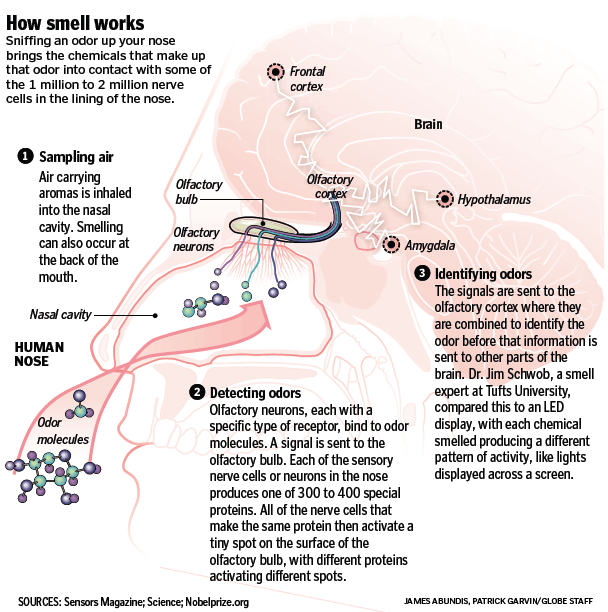 Take a deep breathe in through your nose. What do you smell? Lunch? Pencil lead? Somebody mowing the lawn? Whatever it is, you just utilized one of the most basic senses we humans possess. It can alert us to the danger of a fire or rotting food, and allow us to appreciate the scent of flowers and perfumes. But how exactly does the sense of smell work?
Take a deep breathe in through your nose. What do you smell? Lunch? Pencil lead? Somebody mowing the lawn? Whatever it is, you just utilized one of the most basic senses we humans possess. It can alert us to the danger of a fire or rotting food, and allow us to appreciate the scent of flowers and perfumes. But how exactly does the sense of smell work? When you inhale, chemoreceptors (a form of sensory cells) detect tiny molecules of the substance that are floating in the air. Everything and anything that you smell gives off these molecules. These chemoreceptors are specialized neurons, similar in size to a stamp. This section is referred to as the olfactory epithelium. They are exposed to the air and project cilia outwards to increase surface area. The molecule of smell will attach to the cilia and cause a reaction in the neuron. The chemoreceptor then sends electrical signals to the brain, which then interprets the signals and converts them to a smell.

Fascinatingly enough, every chemoreceptor is encoded by a separate gene. If this gene is missing or not intact, one will not be able to smell a specific scent. If these neurons are lost or damaged, they can result in a syndrome called anosmia. Anosmia is the total loss of smell, and can have many causes. These include, but are not limited to:
- head trauma
- old age
- toxins
- intranasal drug use
- smoking
- nasal polyps
- upper respiratory tract infection.
More interesting than the basic process of smell, however, is its connection with memory. A specific smell can evoke various memories and moods in different people. This is due to the fact that the part of the brain that deals with smell (the olfactory bulb) is positioned inside the limbic system - the section of the brain that deals with memory and feelings. This allows connections to be made between these two systems easily. However, the key aspect of this phenomenon is the idea of "conditioned responses." When one encounters a new scent, one connects it with the place and activities that are ongoing. For instance, the musty smell of old books in a library, or the scent of baking cookies at your grandmother's house. This may be part of the reason why people show different preferences towards various smells.
Sources:
http://science.howstuffworks.com/environmental/life/human-biology/smell.htm
http://health.howstuffworks.com/human-body/systems/nose-throat/question139.htm
http://en.wikipedia.org/wiki/Anosmia
http://en.wikipedia.org/wiki/Olfaction
Images courtesy of:
http://www.boston.com/lifestyle/health/articles/2011/07/18/how_smell_works/
http://purplepaperplanes.files.wordpress.com/2010/03/smell_flower.jpg
No comments:
Post a Comment